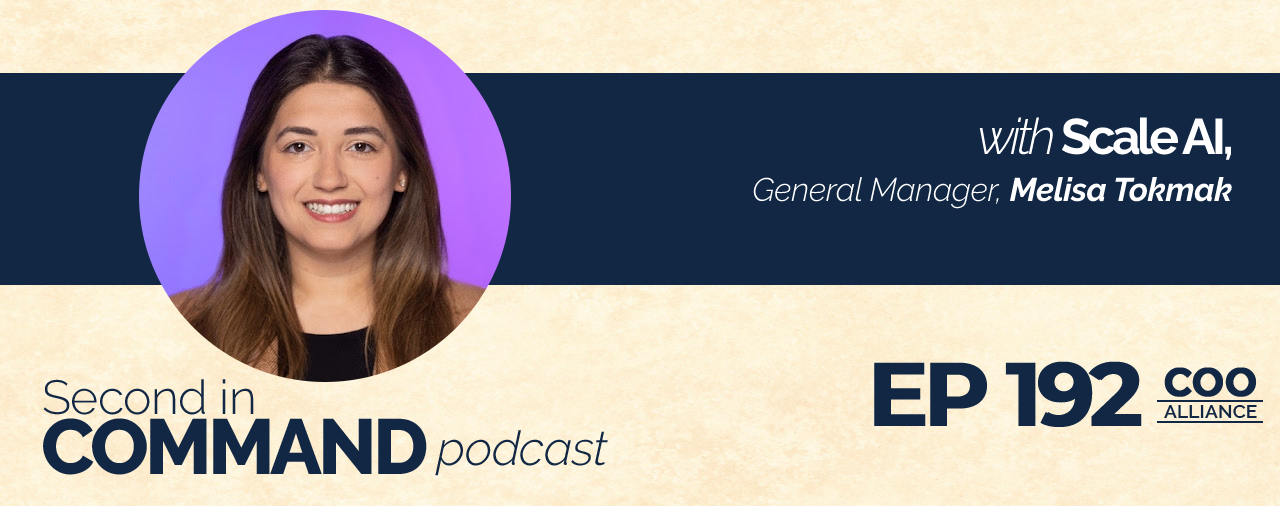Melisa Tokmak is the Head of Scale AI’s Document AI business, which focuses on building fine-tuned machine learning models to process documents at high quality. As the founder and leader of this unit, Melisa supports a team of engineers and machine learning scientists, as well as product, operations, sales, and marketing.
She is now spearheading Document AI’s expansion to serve a wide range of industries, including logistics, financial services, healthcare, and beyond.
Prior to this role, Melisa was Scale’s Chief of Staff, serving as CEO Alexander Wang’s right hand, and founded Scale’s government unit, a key driver of growth and opportunities for the company. As a result, Scale now works with agencies including the U.S. Army, the Department of Defense’s Innovation Unit (DIU) and the U.S. Air Force.
In This Conversation, We Discuss:
- How machine learning creates autonomy for many businesses
- How Melisa was able to attract talent into the company
- Melisa’s transition from her role in Facebook to Scale AI
- Defining the chief of staff role
- How to build a thriving organization with a team of responsible employees
Resources:
Scale Ai – https://scale.com
Connect with Cameron: Website | LinkedIn
Get Cameron’s latest book: The Second in Command – Unleash the Power of Your COO
Subscribe to our YouTube channel – Second in Command Podcast on YouTube
Get Cameron’s online course – Invest In Your Leaders
The post Ep. 192 – Scale Ai General Manager, Melisa Tokmak appeared first on COO Alliance.
—
Before we jump into the episode, you need to know about two important ways that we can help you and your company grow. Number one, check out the COO Alliance. It’s for COOs Presidents, VP Ops, or whoever’s your company’s second in command to the CEO. The COO Alliance is the world’s leading community for the second in command, and it gives COOs the tools and connections to grow themselves and the company. Head over to COOAlliance.com to learn more about our members and the results of the program, and our 10X guarantee. If you qualify for membership, you can set up a complimentary call with our team to discuss if it’s right for you. I’ll tell you about number two in a bit. First, let’s start the episode.
—
Our guest is Scale AI‘s GM, Melisa Tokmak. Melisa is the head of Scale AI’s Document AI business, which focuses on building fine-tuned machine-learning models to process documents at high quality. As the Founder and leader of this unit, Melisa supports a team of engineers and machine learning scientists, as well as product operations, sales, and marketing.
She’s now spearheading Document AI’s expansion to serve a wide range of industries, including logistics, financial services, healthcare, and beyond. Prior to this role, Melisa was Scale’s Chief of Staff, serving as CEO Alexander Wang’s right hand, and founded Scale’s government unit, the key driver of growth and opportunities for the company. As a result, the Scale now works with agencies, including the US Army, the Department of Defense’s Innovation Unit, and the US Air Force. Melisa, welcome to the show.
You guys are doing cool stuff, and I have a funny story to lead us into this. My first use of high-quality document scanning was years ago when I was the COO for 1-800-GOT-JUNK, and I had just finished one of the very first core projects and was writing the operations manual for all of our franchisees. We only had twelve franchisees at the time. Now everyone knows the name 1-800-GOT-JUNK, but no one did back then.
Brian, our CEO, by mistake, deleted the server. Everything on the server was deleted except the documents that were open on people’s computers, and we only had twelve employees. The only documents that were saved were on their computers. We had no successful tape backups of the server at all.
We lost everything, including the operations manual that I just had completed, but we had one hard copy of it that we’d printed out, and we ended up having this thing scanned and then OCRd and it worked, but for years we’d find all these ridiculous spelling mistakes that the computer had made. The quality was good enough for us back then, but not to work for the Air Force.
I’m glad technology has come a long way since then. It’s a funny story.
Tell us briefly what Scale AI’s use case is and who your customers are. You gave us some of the bigger customers, but who are your bread-and-butter customers or is it the government at large scale?
Scale, as a whole, is a machine-learning infrastructure company. What we do is help other companies to be able to operationalize machine learning in production. Use machine learning to be able to automate different tasks and have the high-quality training data to train your own machine learning models. That’s how Scale started. When you think about machine learning infrastructure as a pyramid, I think of the bottom layer as data. That’s where Scale built its first products on the data annotation side, and these were augmented machine learning, so we could support companies to build their own machine learning models. Once you get very good at that layer, it opens up different stacks in that pyramid.
One of them being built the models themselves, what we call Models As A Service. My unit focuses on how we build these machine learning models for other companies who don’t want to build them so that they can easily plug into it via API and use it. Document AI is the biggest product in this business unit. It’s helping other customers come in and process their documents and extract key information from complex document types, both unstructured and structured so that their people don’t have to do this tedious, difficult job.
The customer focus is placed on financial services, healthcare, logistics, and government. Government is not the only area. We are bigger in terms of logistics and financial services areas because these customers are getting a high volume of documents. Some of them have millions of documents in a given year.
Their business outcomes depend on processing these documents at a high quality. If they don’t extract the information right, they may be breaking a regulation or they may not be getting paid in the case of logistics. It might cause a lot of escalations that degrade customer experience, but it also causes 10, 20 days delays and bring various other OPEX costs that come with it. The amazing customers are those who process high volumes of documents and need high quality that other off-the-shelf models may not give them. Hence, we take the fine-tuned model approach.
You’re crazy smart. You’re also crazy young. When we were talking before we came onto this, I think that was something you and I had mentioned was you and Alex in starting the company or you were involved at the early stage. How did you go about attracting talent to work for you when you were so young? How did you go about attracting investors when you were so young? Walk us through that.
All the credit is due to Alex when it comes to investors and getting the company off the ground and having all the success. I joined them afterward. The early days have already passed, but I think you are right when you say that’s a challenge that I face every day, especially growing my team and various teams at the company.
Not only this business unit, but when I was founding the government business unit as well, that comes up every day. It’s not a challenge that I would say I have conquered fully. It will still come up, but my style, I call the elephant in the room, when I’m pursuing different candidates, especially in this environment where everyone is hiring and the talent is hard to capture. If you look at the startup market now, with a lot of capital floating by for startups, everyone’s trying to hire the best candidates. I have the benefit of Scale’s brand. Everybody wants to work for Scale, especially if they are in the machine learning area, because it’s the best place to be.

Scale AI: If you look at especially the startup market right now, everyone’s trying to hire the best candidates.
However, that is not enough multiple times. In those conversations, I just come clean. I go ahead and talk about that how I can support these candidates well and what I expect them to take on might be areas that I may not be the expert in. I use that as an opportunity to show them how they’re going to have autonomy in the areas that they are bringing the expertise, but what I am unlocking for them.
That honest conversation early on with senior candidates goes a long way because they see the transparency and that partnership, and they want to come and join. The second big part is how much about your product and how much of a vision you have and how you can articulate it. Especially with the candidates, I want them to join us. I have these sessions with them where I talk about the vision of our business unit and how that ties to the Scale’s plan not only now but also in the future. How we fit into it and why it’s so important to be able to make this a reality goes a long way, too, when people see what type of vision they’re going to be part of.
How did you learn this? Did you learn this from trial and error? Did you learn this through mentoring? Did you learn this through reading books or through your schooling? Where did you come up with the understanding that transparency and product knowledge and that confidence, those three things layered in were going to serve you this well?
It comes down to a few things. One, I always think about it in the sense that what I would want when I was looking to work and startups. When I was deciding to join Scale, what did I want? I wanted full transparency. I had a great job, that I was excited to come into a place where the action is every day in startups. I always thought, “What did I want?” I wanted radical transparency about how things were going to work out. I want to be prepared for it. I want to join with great passion because I know exactly about the highs and the lows. I can get through it.
Second, I wanted autonomy. I know that I can do it and I want that space to be able to do it. Lastly, I wanted that partnership, being around extremely smart people who will partner with me. I will learn from them and they’re going to learn from me, that environment, the culture. I already knew a bunch about machine learning, but you want to get deep into why this company is going to be successful. Why these products? What I would expect leads me to how I approach hiring other people.
The second bucket is really about creativity when it comes to specific candidates. All of us care about different things in our lives. You need to hone in on what they care about and show them if that will be satisfied in this case, which I attribute to my journey from a small place in Turkey. I was born in a tiny village and trying to make it to Stanford University for a college education and then in Silicon Valley to these positions that I’m holding now, it always required being quick on your feet and the creativity. If Plan A doesn’t work, what is plan B and if that doesn’t work, what’s plan C? It’s how the brain is wired if you have to go through it.
All of us care about different things in our lives. You really need to hone in on what people care about and show them if that will be satisfied.
What’s the size of Scale now? How many employees do you have?
I believe we’re coming close to somewhere around 400 and going to 500 soon.
Are you the second in command to the CEO on the whole company or one of the company’s major divisions? Where do you fit in the org chart?
I joined as second in command to the CEO for the whole company. Afterward, during that time, have built the government business unit and got that bug. I want to build more business units and I started this Document AI business unit separately. Now I’m fully focusing on that, trying to make that one of our biggest offerings, but that’s how I started and moved to build specific business units and products myself with my team.
When Alex started the company, he was nineteen, you’d said earlier.
I joined two years out of college to Scale. Right out of college, I started working at Facebook and then quit after two years and joined Scale and have been here since then.
Can you talk about that transition and why would you leave Facebook for Scale? What do you think it was that had Alex say yes to bringing you in? You came into a senior role very early.
It’s a funny story. First of all, I enjoyed my role at Facebook, but I think inherently, when you’re working in bigger companies, however much effort you put in, there’s still a ladder, and not everybody has to be like this. I am an extreme hard worker and I take pride in it and I want to be that as long as I can. I realize been putting in so much into it in my role. I want to be around people who do the same with me because I think that multiplies the output in a way that you cannot imagine. When I put so much of myself into it, I want to get back, whether it is more challenges and the role and the scope or the things I get to influence.
I realized that I didn’t want a ladder. I want an elevator. That’s what brought me to thinking about Starbucks. At the time, I was thinking of leaving and founding my own company, but we got introduced, via an investor, Alex and I, for a completely different purpose. It was not for recruiting. It was about the fields and how to build various products to be able to support bigger tech companies. During our conversation, something clicked, and that was about how we think about the area, machine learning. At the same time, our values. I got this call. We kept meeting up to talk about the issue more.

Scale AI: “I don’t want a ladder. I want an elevator.”
About a week and a half later, he called me and said he has this special role and wants to pitch it to me on the phone. I was like, “Go ahead.” That pitch was tailored to me, and that’s one of my learnings. Now I do the same when I work with people. It hit it on the spot about the things I care about and why I should join in that role to this company. I moved. I said yes, changed jobs within two weeks, and decided to delay my dream of founding a company because I thought it’s worth it.
He saw something good in you. He tailored that role or spoke to you in terms of that role. Was that the chief of staff role?
Correct.
What was the chief of staff? It’s a term that we’ve heard tossed around a lot over the years, but what was it when you got involved?
The chief of staff means many different things when you look at the industry. It’s a full spectrum like someone who might assist you as an assistant versus what we see not only with the government, like Amazon and various investor firms, the company second in command. For that case, he was looking for somebody to multiply himself. The company was going through rocket-ship growth.
As CEO, you can get many things done, but at some point, you need to effectively hire people that can step in as you in various areas that you want them to. That was the role and it was vague in the beginning. I don’t like vague things in the sense that I’m happy with ambiguous projects and taking down challenges, but in terms of expectations at a high level, every party needs to agree.
As CEO, you can get so many things done, but at some point, you need to effectively hire people that can step in as you in various areas that you want them to.
After that pitch, and I enjoyed the pitch, I wrote my own definition of what I want to be in the company and what areas I want to help with that I see necessary as someone looking from out to in. It’s not 100% correct and some of the areas I don’t know about and I would want to take on get down and build. We had dinner, and it was a long dinner because I walked through absolutely every bullet point in my definition and asked for his opinion, whether it’s something that he sees the role take on or not.
We did not move to the next item until we came to an agreement about the item at hand. That set the stage for what he should expect from me, which is a lot. He should expect a lot from me if you are bringing somebody to that role and what I would expect in return, which was all about opportunity, transparency, and partnership. Celebrate the highs and get them, but also handle the lows, get back into it and continue building it.
If you were to describe to your grandparents what is the chief of staff? We know that the chief marketing officer is the head of marketing, the VP of sales, the head of sales. What’s the chief of staff in layman’s terms?
It’s very important to define the stage of the company. When I did that for this company, we were a lot newer and smaller. For that company size, you define it as somebody who can mold into the role of CEO in the areas needed. For that, sometimes it meant for me, there was an issue. Who can I deploy to go fix it and not worry about it? To this person, when I was looking into building the government business unit, I seize an opportunity and took it off the ground with no help. Seize another opportunity, make a plan, and pitch it to build new business units like I’m doing with Document AI now. In layman’s terms, for early companies, it should be people who can mold into the role of CEO in the areas needed.

Scale AI: For early companies, a chief of staff is someone who can mold into the role of CEO in the areas needed.
What have your growth areas been? In terms of the years that you’ve been with Scale, where have you had to continue to grow as a leader, as an executive there?
I would say this becomes very handy as a chief of staff. You have to handle 1,000 different things at a given time and make sure that all of them end in success. It’s the life of being able to handle anything that might come up. They change in terms of topic and scope. Some of them are building something from the ground up to another one solving management issues or people issues. I felt very good at that. I felt like I am thriving and love that high-stress lifestyle. It makes me thrive. One area that I felt like I need to get under my belt is what happens when you have to focus on one area if everything you want to live and breathe is about that, whether it’s that business unit or that product. Everything about it.
Underneath it, there will still be 1,000 areas, from how you build the product to engineering to marketing, etc., but everything is still about that. I thought that would add a lot to my life. As I have been building other business units and, in this case, everything I’d live and breathe is about my business unit. I grew a lot in that sense, being able to focus my internal self. If I see a problem, I’m like, “I want to go and solve that,” but no, I need to live and breathe, making this unit a success and building state-of-the-art models to achieve this for various industries. That was one of the areas that I grew a lot on.
Secondly, I would say hiring. You brought this up a lot, building teams. You’ll always see highly entrepreneurial people, young people who are hungry, excel at execution and strategy. They want to do everything and they can. If you force me, I will not sleep until that is done and it’s successful. That is a great skill. However, when you are building an organization, it’s even more important as you grow to be able to build standing organizations that can do it, not depending on your help and ability to pick things up.
As a leader, you should always be able to pick things up in any area. You should be working harder than anyone on your team, but building that organization is important, and hiring is the biggest part of it. I would say I fight that urge in me. Do I pick it up and can I handle it? No. How do we build this organization to multiply its output and thrive in this industry with the people we’re hiring?
As a leader, you should always be able to pick things up in any area. You should be working harder than anyone in your team. But building that organization is so important, and hiring is the biggest part of it.
Do you think that changes when you haven’t been able to raise money? If a company is not VC funded, does that mentality of continually hiring, replicating, and focusing on growth? Do you have a different lens on that, do you think, or a different filter?
Yes. I would say change, but it doesn’t even have to be about companies that don’t receive VC funding. Scale has received incredible VC funding. We are doing well in that area. However, from the beginning, Scale has been a company that values building and getting to success with a lean team. That’s important, especially early on, because you are setting the culture of achieving impossible things with the smartest, hardworking people you can bring together and build the best products. At such a culture, it forces prioritization for the right things and makes you agile to pivot if you need to.
That was a question that I had for you. It wasn’t on the agile. It was on how you stay focused when you have so many opportunities. You talk about that singular focus, that singular lens in terms of even building your business area or the company. How have you been allowing yourself to say no to certain opportunities? You do stay focused. There are many different places you could be spending your time and energy.
That’s hard. If you’re doing this for the whole company, hopefully, the chief of staff role takes that a little bit. The founder should push the whole company to be able to do more. It should be their mindset. However, you want to surround yourself with people who can bring that great tradeoffs for you. You know the tradeoffs, but as a founder, you should always push your team to be able to conquer more. Those people can talk through the different tradeoffs and sometimes draw the line. We may not be able to do that and here are the reasons why that’s not the greatest way. I take a similar approach in my unit. It’s hard to say no to other things if they are right there. They’re shiny objects.
I try a few different things. One, you can learn a lot from researching the different areas, talking to customers, and understanding their needs. Once you find the need, you are also looking at, “Is this a lucrative business area? Is it going to grow in terms of the captured TAM?” Once you find those areas, it’s important that you don’t immediately go after it with everything you’ve got. You have to make sure you’re funding enough experiments to find other areas like that. Not every time everything works out according to what you heard from customers, user interviews, or your research, but you have to try it out in action. If you are going ahead supporting the key customers, you have to get those few customers.
How is that going? Are they receiving value? Are they raving about the value that they’re receiving from you? If not, you have to be always in tune with the why because those are the areas you keep tuning the product to get to success. At the same time, I found those other experiments, make sure a person or some of my time goes into understanding other industries in problem areas so that they’re cooking. Whether they can be the next product or if something happens to this, they can help in the understanding of where to pivot to and why. That’s a good way of thinking as operators.
Do you turn it off?
I don’t, but it depends on what you need as a person. I have noticed that I don’t like turning it off and it doesn’t help me. It makes me feel more anxious. What I realized is sometimes it helps to change the environment. I might not turn it off, but make sure I’m in a different place or city or make sure that I make time to do other things that week. You just have to understand yourself the best. For some people, turning it off is the only way that works. For me, I realized that makes me feel worse.
Do you like being engaged and immersed in the business?
Yes. It’s also a bit about the feeling of responsibility. When I think about my team, I’m asking something hard of them. I’m asking them to build incredible products and ambitious goals with a lean team. I feel that responsibility that if I am not ready to do that, how can I ask that from my team? This was one of the reasons when I think about my experience working in bigger companies or even at Scale.
The reason that fueled me when working with Alex extremely closely, I never thought that he ever asked me something he wouldn’t do himself harder, better, and in longer hours. Seeing that brings the partnership and I felt like I want to do more because I’m in an environment where we care about the outcome of this and we are ready to be fully immersed. I feel the same about my team. How can I ask them to be immersed if I’m not?
What are you looking for? Where do you find your team? Do you find them through traditional channels? Are you poaching them? Are you working with an HR or recruiting department?
We have an awesome recruiting department and I work with them closely, but I don’t believe in building lean teams for new products working in startups. In this case, my unit is working like a startup and needs to be a successful startup within a startup. You, as an operator, should not only lean on recruiting because you, as the founder of that unit or as the operator building the team, it is your duty to be out there and talking with the customers, finding the best fit from both sides. At the same time, you’re convincing them.
We talked about the hiring market and it’s hard. Every startup seems like there are many startups looking like they’re doing well. It is your duty to be able to make that person feel so passionate about joining this team. I work with our recruiting team. They’re amazing in helping me hone in on exactly what I’m looking for. Once we do that, they are helping me with sourcing if we need it, but I do my own sourcing as well. Over the years, I have built an incredible group of people, friends, colleagues, peers and more from the previous companies I have worked with, also from school and the community I have built in Silicon Valley. I tab onto that a lot.
I have candidates as well that are looking good. I take an active role in talking to them as the first call and chiming in and coming in looking at, as they’re meeting with the rest of the team, what’s going well, what needs they’re bringing it up or what concerns. I always check in with them to be able to close them as well.
I wouldn’t let you anywhere near my company’s front door if I were a CEO because I know that you’d be snagging all the good people. You have that fierce competition about you, which is amazing. Do you find that when you set such a high bar for new hires, it attracts them? It doesn’t turn them away?
You have to set a high bar for new hires. The culture is hard to create, and once you do, you have to guard it so that nothing degrades it. It’s not even only about keeping the high bar only for the company’s sake, but also for the candidate’s sake. It has to be a fit from both sides for them to thrive and get the results that they want to get to.

Scale AI: You have to set a high bar for new hires because culture is very hard to create and once you do, you have to guard it so that nothing degrades it.
We try to replicate that in the interviews, in the conversations so that it is a mutual fit and this person is going to thrive when they come in here. I also keep my hiring manager interviews transparent in that sense. Talk about, “This is what I care about as a manager and supporting you in any way that I can, especially for your priorities in life, but here are also the things that will come up. I need to know that you’re coming in with open eyes and excited and want to put in that effort and the time.” It attracts the right type of candidates.
You worked inside of Facebook and there are two types of people that work for these large tech companies. There are the entrepreneurial spark people that like yourself have that I’ll go start my own company tomorrow, I can work with a startup, I can get it to go or there are the corporate drones who are there and they’re playing the politics and doing the corporate thing. When you’re outside of that, building a company and looking to hire people, how do you know which ones? What are the behavioral traits or what are the things that you look for to know that you’ve got the right people versus the corporate political people?
The interview cycles have many interviews you can do short. It’s hard to get to the bottom of it. A few tactics that I found work. First of all, across the board, I focus on the results they have produced in their jobs, their lives, and the results of their challenges. It doesn’t only have to be right in the job market. For newer junior candidates who are dried out of school or like one year into work life, you may not see that exactly in their work life. I am trying to understand, does this person value learning and using their learning in practice? What have they built with their own hands? It doesn’t always have to be I shipped this product. Obviously, that helps, but what have you built in your life apart from that?
One of them could be your life. How have you built your life? Every answer that I hear, I try to dig into the why and the how. That’s where it comes up. It’s easy to hear from those more corporate people valuing politics more and spending their time with it. They might say, “I have built this,” but it’s a whole team’s effort. They might not be able to do anything. You need to dig into what parts they have built, what parts they have gotten our help, and how none of us can build anything only by ourselves to a great degree. It’s also important how they worked with people when they were building that. I try to go like the why and how always.
None of us can really build anything only by ourselves.
What did you do during your undergrad and what were you at school at Stanford for?
I studied Computer Science.
You’re not taking business courses. You’re not sitting there learning organizational behavior and interviewing. Where have you learned this stuff?
I took like 1 or 2 classes. Stanford does a good job. Even when you’re studying Computer Science, you can take interesting courses. I don’t know. To be frank with you, these are things that appear in my mind. This is my 1st, 2nd and 3rd step. If the first step works well, I keep doing it. If it doesn’t fully work well, I tune up the second step. When I think I have to come up with a reason, genuinely, how I approach my life, it has been a guiding principle.
It’s like how I learned English in high school. My parents don’t speak English. They haven’t ever done anything related to tech. My whole town didn’t know what Stanford was until I joined. It’s that mindset when you have goals and you want to get to them, how are you thinking about the steps? If something is not going to work out, how would you come up with it? You know that there is no help to lean on if something doesn’t work.
Is that how you see everything as the playbook or the system, like the steps to do, whether it’s getting up in the morning, there’s a series of steps, or hiring a team? Do you see things that way or do you think through, and then do you iterate as you continue? Do you keep refining those systems?
Yeah. For every problem I see, I approach it from first principles, getting to the core and understanding what is this about? That being said, you can’t solve every problem with a system you have according to how it works out. When you approach it from first principles, it might give different results. You develop intuition from yourself. It’s important to know and be self-aware when you can trust your intuition versus not. For example, I do trust my intuition when it comes to people and reading the room, building relationships and those dynamics. I have found that I can trust that intuition, so I go. For many people, they may not, and they shouldn’t. They should keep it more data-based.
I would say the trick is, at least for me, have worked start from first principles and think about what needs to be done to make this a success. Along the way, Io rely on my intuition and the group of people surrounding me in an amazing way. There are many things I’m learning here and the way to learn them is you put in the effort. I’d like to go into the heart of the fire and learn by doing, but at the same time, have an amazing group of both colleagues and mentors. Many of them are peers because you learn better from peers going through the same problems and tap on them when needed.
Where are you working on in terms of your skills? What are you working on now for yourself?
In terms of work, I would say it’s what I was mentioning about fighting the urge of doing things. Relying on yourself only versus building organizations is something I’m learning a lot. In that manner, I try to hone in on my skills on how to think about the structure of a team, but at the same time, I think that’s not enough at startups, there’s not much hierarchy.
Everyone needs to be able to pick up anything they want and go ahead and that excites people, including me. It becomes a lot about thinking on the goals and the metrics. I continue to grow on those. What are the right goals, how can you tell, and what are the indicators to show that you are getting to it or need to make changes? I spent a lot of time there.

Scale AI: In a startup, everyone needs to be able to pick up anything they want and go ahead. And that excites people.
Secondly, it’s learning about the industries that I’m supporting. You would say I haven’t spent 20 or 30 years in these industries, but I take it as it is my job to know them as much as I can because I’m supporting those people to become more efficient and get value. If I don’t know, if I don’t understand, why should they trust me? I spend quite a bit of time in my personal life as well, free time, in learning about financial services and logistics. I’m getting to the bottom of it, like what does it mean? What are they trying to do? Even go meet people, specifically operational people in those areas to understand what they need to do to get their job done so that I can help them.
I want you to lean back a little bit to when you were graduating from Stanford and you were going out for your first career job. What advice would you have liked to have known back then to be true now but you wish you’d known a few years back?
I optimized the decision a lot. I have thought about it in multiple different ways and how to be able to get to the best thing. It’s stressful, especially for seniors in college, to go through that. In the end, what it comes to when I look back, as long as you’re trying to go to a place that is growing, it doesn’t matter in the sense that A or B. There are simple decisions you need to make.
One, can I go to a place that’s going to continue growing and I am going to have a responsibility where I can learn a lot. I don’t mean like you feel like learning every week, every day or every hour and you’re feeling like, “I don’t know this, but I’m going to figure it out in this hour and the next hour, I’m going to be able to do it.” As long as you check those boxes, I would say it will be okay, especially for your first job out of college. Sit back and enjoy the hustle of learning and appreciate that.
Melisa Tokmak, the General Manager from Scale AI. Thanks so much for sharing with us on the show. I appreciate the insights, inspiration, and lessons. This was great.
Thank you so much for hosting me.
I appreciate it.
Important Links
About Melisa Tokmak
 Building AI products at Scale AI. Previously built our government business unit.
Building AI products at Scale AI. Previously built our government business unit.





